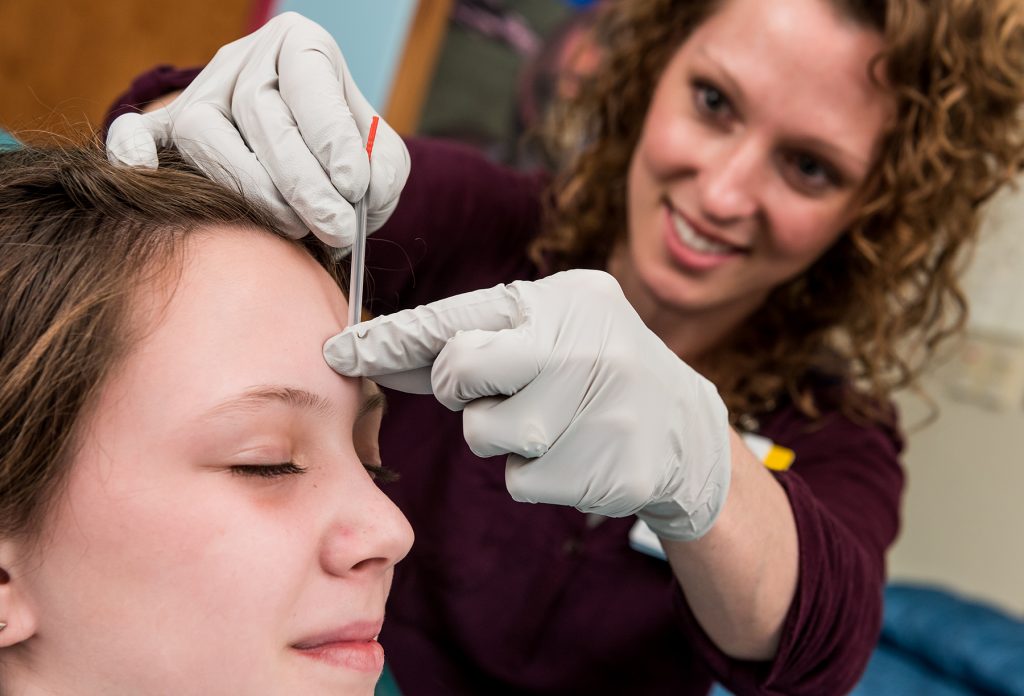This post is sponsored by Children’s Mercy.
If your kid experiences frequent headaches, you are not alone. More than 40,000 kids in the Kansas City metro suffer from headaches. The good news is that headaches aren’t usually serious, but they can still be debilitating and impact quality of life.
Parents often tell us they don’t know what to do to help their kids. Not knowing how to help your kid is one of the hardest things about being a parent. With some knowledge about headache triggers and treatment options, you can help your kid get pain under control.

Diagnosing headaches
There are more than 100 types of headaches, and doctors can usually make a diagnosis by asking questions and performing an exam.
- Tension-type headaches are the most common type and cause mild to moderate pain. They come and go and usually don’t have any other symptoms.
- Migraines are moderate to severe headaches that are made worse with light or noise and can be aggravated by simply moving your head. They may be associated with nausea and vomiting. Typically, we tell parents that if a headache is severe enough to cause a child to want to lie down in a dark quiet room, it is usually a migraine. Migraines are the second most common cause of disability worldwide (back pain is number one). They can be painful, frequent and difficult to control. The vast majority of people will have episodic migraines, which means they’ll have the headache a handful of times each month. But one out of 100 teenagers has headaches every day.
What causes headaches?
Headaches are caused by a mix of genetics and environmental influences.
About 70 percent of people who suffer from migraines have family members that also have migraines. Many times, people don’t even know there is a family history of headaches. If your child has frequent headaches, ask other family members if they have headaches too. You might be surprised by what you learn!
We know environmental factors like stress, nutrition, hydration, sleep, weather, and even menstrual cycles, can affect headaches.
Most headaches are caused by a simple change in the electrical balance of the brain, and those who suffer from migraines have a harder time adjusting to change and maintaining a balance in the body. For example, if the weather pressure changes, most people experience the pressure change without any problems. For a person who suffers from headaches, the pressure change can trigger a migraine. The same thing happens when lunch or dinner is missed. Most people are okay, but for those who suffer from migraines, the brain can be overresponsive, which results in a headache.
An increase in headaches happens every August and September. Our patient volumes and phone call volumes significantly increase. The reason? It’s back-to-school time. This doesn’t mean your kid hates school and wants to avoid going. In fact, many kids who love school also have headaches around this time because their brain is trying to adapt to the change in routine.
While stress doesn’t cause migraines, kids with headaches often benefit from learning advanced stress coping skills. We like to say that stress is to migraines as cupcakes are to diabetes. It doesn’t mean your child is more stressed than their peers, it just means they manifest the stress in different ways.
Treatment
There are no cures for headaches, but there are lots of treatments that can help!
Most kids with headaches don’t need medication immediately and will feel better with a little bit of water and relaxation. However, you’ll want to keep a close eye on them, and give pain reliever if they don’t feel better in an hour or so.
However, if your child has migraines, you’ll want to give an over-the-counter medication at the first sign of a headache. You won’t want to take the “wait-and-see” approach in this case because if the headache becomes too severe, it might become harder to control.
Migraines can last anywhere between two and 72 hours. If over-the-counter medications aren’t working, other treatments are available. These include prescription medications, cranial nerve blocks, intramuscular injections, and IV medications. There are also non-pharmacological approaches that provide comfort, such as neurostimulation devices, acupuncture, and aromatherapy.
Since light, noise or movement can aggravate a headache, create a cave-like environment for your child. Find a dark, quiet room for them to rest.
Tips for parents
A majority of kids will complain of a headache at some point in their lives, and an occasional headache is not concerning. In fact, a lot of people don’t understand that younger kids can get headaches too. A very basic way to think about it is that 3% of 3-year-olds, 10% of 10-year-olds and 15% of 15-year-olds get headaches.
Since you can’t see headaches and they don’t show up on medical tests, we recommend you believe your children when they say they’re in pain. However, you also need to encourage them to function. Help them learn some pain coping skills before the next headache occurs. You can teach them breathing exercises, progressive muscle relaxation, or guided imagery techniques that they can use when they have a migraine. (See our headache relief guide to learn these techniques.)
Missing school once or twice a year for a headache is reasonable. If your child is visiting the nurse’s office once a month or more, you should make an appointment with your pediatrician. You should also consult your child’s primary care provider if headaches are occurring more frequently than four times a month. This doesn’t necessarily mean it’s serious, but it might be interfering with your child living life to its fullest.
There’s a lot of misinformation out there about headaches and getting the right treatment at the right time is important.
This post was written by Jennifer Dilts, DO, FAAP–Director, Comprehensive Headache Clinic, Children’s Mercy
- Learn more about the Headache Treatment Center at Children’s Mercy.
- Learn more about the Headache Clinic at Children’s Mercy.
- Learn more about the benefits of acupuncture at Children’s Mercy.
















